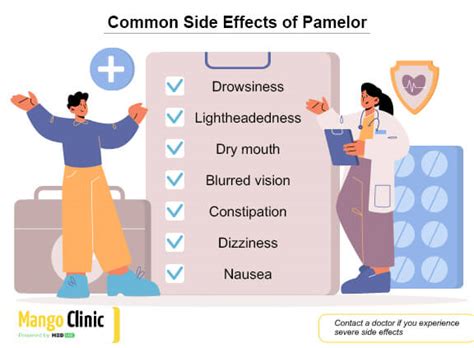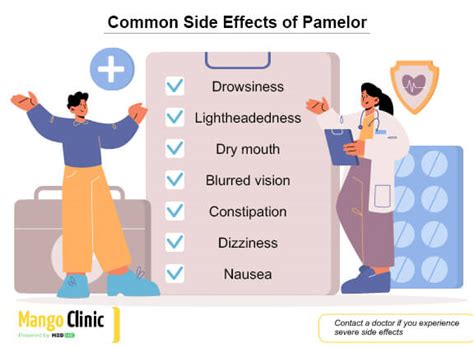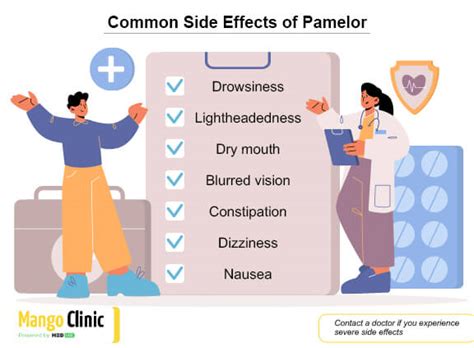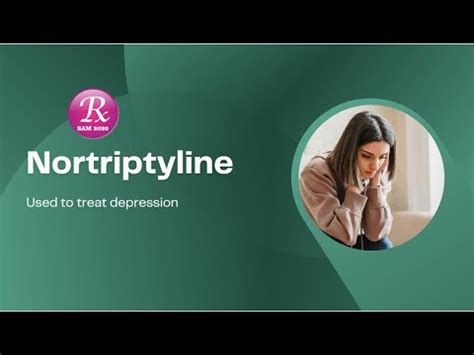Intro
Discover Nortriptyline side effects, including drowsiness, dry mouth, and constipation, as well as rare effects like seizures and suicidal thoughts, to make informed decisions about this tricyclic antidepressant medication.
Nortriptyline is a tricyclic antidepressant medication that has been widely used to treat depression, anxiety, and other mental health conditions. While it can be an effective treatment for many people, it's essential to understand the potential side effects of nortriptyline to ensure safe and informed use. In this article, we'll delve into the world of nortriptyline side effects, exploring the common, less common, and rare effects that users may experience.
The importance of understanding nortriptyline side effects cannot be overstated. By being aware of the potential risks and benefits, individuals can make informed decisions about their treatment and work closely with their healthcare provider to minimize adverse effects. Moreover, recognizing the signs and symptoms of nortriptyline side effects can help users seek medical attention promptly, reducing the risk of complications and ensuring the best possible outcomes.
As we explore the topic of nortriptyline side effects, it's crucial to remember that everyone's experience with the medication is unique. While some people may tolerate nortriptyline well, others may be more susceptible to side effects. Factors such as age, health status, dosage, and individual sensitivity can all play a role in determining the likelihood and severity of side effects. By understanding these factors and being proactive about monitoring their health, individuals can navigate the potential risks and benefits of nortriptyline treatment.
Common Nortriptyline Side Effects

These side effects are often temporary and may resolve on their own as the body adjusts to the medication. However, if they persist or worsen, it's essential to consult with a healthcare provider to discuss possible adjustments to the treatment plan.
Less Common Nortriptyline Side Effects

These side effects may be more severe than common side effects and can have a significant impact on daily life. If experienced, it's crucial to seek medical attention to rule out any underlying conditions that may be contributing to these effects.
Rare but Serious Nortriptyline Side Effects

If any of these rare but serious side effects occur, it's essential to seek emergency medical attention to prevent long-term damage or complications.
Nortriptyline Side Effects in Specific Populations

It's essential for individuals in these populations to work closely with their healthcare provider to monitor their response to nortriptyline and adjust the treatment plan as needed to minimize risks.
Minimizing Nortriptyline Side Effects

By being proactive about minimizing side effects, individuals can reduce their risk of experiencing adverse reactions and ensure the best possible outcomes from nortriptyline treatment.
Nortriptyline Interactions and Contraindications

It's essential to inform a healthcare provider about all medications, supplements, and substances being taken to minimize the risk of interactions and contraindications.
Nortriptyline Withdrawal and Dependence

To minimize the risk of withdrawal, it's essential to taper off nortriptyline gradually under the guidance of a healthcare provider.
Nortriptyline Overdose

If an overdose is suspected, it's essential to call emergency services or seek immediate medical attention.
What are the most common side effects of nortriptyline?
+The most common side effects of nortriptyline include dry mouth, dizziness or lightheadedness, drowsiness or fatigue, headache, nausea or vomiting, constipation, blurred vision, weight gain or loss, increased sweating, and tremors or shakiness.
Can nortriptyline cause withdrawal symptoms?
+Yes, nortriptyline can cause physical dependence and withdrawal symptoms when stopped abruptly. Withdrawal symptoms may include dizziness or lightheadedness, headache, nausea or vomiting, fatigue or lethargy, irritability or mood changes.
What should I do if I experience side effects while taking nortriptyline?
+If you experience side effects while taking nortriptyline, it's essential to consult with your healthcare provider to discuss possible adjustments to your treatment plan. Do not stop taking nortriptyline without consulting your healthcare provider, as this can lead to withdrawal symptoms.
In
